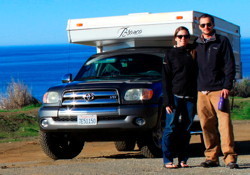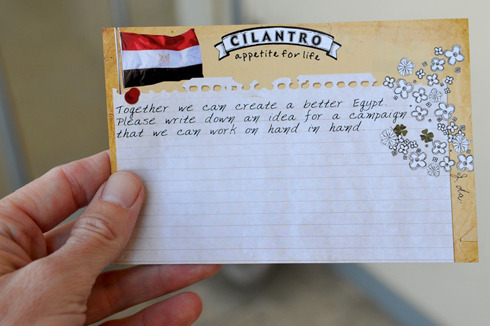Rolf Potts's Blog, page 132
March 23, 2011
Vagabonding Case Study: Gary Misner
http://GaryMisner.com
http://Peoples-Bailout.com
Age: 24
Hometown: Long Island, NY
Quote: "Vagabonding taught me how to act, gave me an open mind to expect the unexpected."
How did you find out about Vagabonding, and how did you find it useful before and during the trip? I first heard about Vagabonding while on a trip in Puerto Rico, I met a man who was a vagabond all his life an found him interesting. He suggested i should read it and i did, shortly after i was on my first "real" trip using references from the book along the way. Most importantly it taught me how to act, gave me an open mind to expect the unexpected.
How long were you on the road? About a year and a half on and off.
Where all did you go? Went through eastern europe, around the USA , Central America.
What was your job or source of travel funding for this journey? Before I began i had made a few investments that funded me throughout the trips, I started a mens accessory line Peoples Bailout that gave me more of an automated cash flow, and i worked odd jobs where ever i could.
Did you work or volunteer on the road? No i did not.
Of all the places you visited, which was your favorite? Italy was my favorite maybe not for geographical reason but because i met my family there that i've never spoken to. They took me in and it was great.
Was there a place that was your least favorite, or most disappointing, or most challenging? Maybe Mexico, I found it hard to get away from tourist traps, and dirty cops.
Did any of your pre-trip worries or concerns come true? Did you run into any problems or obstacles that you hadn't anticipated? Of course but they were not as bad i thought. I found out they never are. Stomach aches, walking way too long, Language barriers, Depression, it just becomes apart of the journey.
Which travel gear proved most useful? Least useful? Most useful definitely a carry on back pack. Least useful , the clothes in it.
What are the rewards of the vagabonding lifestyle? It opened my mind to many new things, and really changed the way i live when I'm "home".
What are the challenges and sacrifices of the vagabonding lifestyle? Loneliness, trying to explain why your doing what your doing.
What lessons did you learn on the road? That people are wonderful, 90% of the people ive met or asked for help genuinely were great people no matter what race or culture. It gave me trust in people again, and taught me how to have fun with little or no money. Made me realize the stuff cluttering my apartment was just stuff!
How did your personal definition of "vagabonding" develop over the course of the trip? I realized that many places i was going people were looking for the same thing, but nobody knew what that thing was. I think it started to develop at Casa Robino in amsterdam when i was staying in a house full of vagabonds. Different personalities with the same goal, To experience life.
If there was one thing you could have told yourself before the trip, what would it be? Just to keep an open mind and go with the flow. If you find yourself bored on another train or bus look beside you im sure that person is just as bored.
Any advice or tips for someone hoping to embark on a similar adventure? Just do it, the timing is never right. Keep all of your perception of a place in the back of your mind for emergencies but other then that be clear. Don't over pack! Clothes are cheap if you really need them. Get ready for the time of your life.
When and where do you think you'll take your next long-term journey? I would love to explore South America and really see for myself what it has to offer. Would love to do this on a dirt bike.
Twitter: garymisner
Website: GaryMisner.com
Are you a Vagabonding reader planning, in the middle of, or returning from a journey? Would you like your travel blog or website to be featured on Vagabonding Case Studies? If so, drop us a line at casestudies@vagabonding.net and tell us a little about yourself.
March 22, 2011
Find the balance between work and life
Nigel Marsh, the author of Fat, Forty and Fired, gave a great talk at the TED Sydney conference that addresses something many long term travelers deal with — how do you balance your life and the need to work and earn money?
As Marsh notes, "I found it quite easy to balance work and life when I wasn't working." That's a sentiment almost any long term traveler can relate to. But what happens when you come home? When you're no longer on the road, even if it's only between trips, it's easy to get trapped into thinking that life is nothing but work and drudgery and only travel is real living.
Travel becomes your escape from a life out of balance.
It works; travel can be a very effective escape. In fact, many people work very hard to turn their traveling into a full-time experience, but that usually involves working on the road, which often has mixed results — turns out it's hard to earn money on the road. Chances are your travel blog isn't going to earn you enough money to travel, there are exceptions, but the odds of you becoming one are slim. Even if you're lucky enough to work in a field that allows you to be on the road and still earning money, you're still working. You're stilling going to have to find a balance between work and your life.
Marsh argues, that it isn't some radical upheaval — another long trip, another new place — that we need but that "with the smallest investment in the right places you can radically transform your life."
Women of the world, according to Sunday Tribune
In my routine travels around the 'net, I came across this absolutely fascinating article called "Women of the World." As well-researched news articles go, it's certainly not comprehensive (besides, everything we read on the internet is true, right? RIGHT??), but it sure gives some fascinating names for future research.
My favorite is Maud Parris, a Yukon dance-hall girl, whose divorce proceedings ended with her mother and father leaping over the bench to punch her husband and the two opposing lawyers engaging in fisticuffs. I'd love to see two lawyers duking it out in court, particularly in what I imagine to be the dignified manner (and wigs) they would have put on way back then (she was born in 1878).
The quarrelsome point I have with this article is that it finishes with, "They don't make them like that any more." Excuse me, Myrtle Ryan, but they bloody well do! For all inspiring female travelers of the modern world, doing fantastically adventurous things, I say: play on, ladies.
March 21, 2011
10 small strategies that will improve your journey
About five years ago, San Francisco Chronicle travel editor John Flinn published a column called "A few things I've learned in a quarter-century-plus of travel." I enjoyed his insights so much I saved the article as a text file — and I recently stumbled across it again on my laptop. Here are my ten favorite bits of advice from Flinn's column:
1. When you're on a lean budget, one step up from rock-bottom is always worth it. Five dollars is often all it takes to upgrade from squalid to tolerable. It's the difference between sweaty torpor and air conditioning in a Marrakesh hotel room, between a writhing dog-pile and a seat of your own on the bus to Dharamsala, between dicey hygiene and the meal of your life in a Luang Prabang restaurant. Don't be a cheapskate masochist.
2. Street food is always cheap and often excellent, but limit yourself to items fresh off the grill. Don't eat anything that's been sitting around; watch the guy cook what's going into your mouth.
3. Plan your trip well, prepare a Plan B in case circumstances change — and be ready to toss both plans out the window when an unexpected opportunity presents itself.
4. Force yourself to be an extrovert. Talk to people. You might find that the white-haired man at the bus stop in Yorkshire flew in the Battle of Britain, or that the Indian woman on the ferry to Koh Samui is a vacationing Bollywood movie star.
5. Build time into your schedule to wander aimlessly. Those magic moments rarely happen when you're following a tight itinerary.
6. Everyday experiences take on new poignancy in foreign countries. Wandering through a Guatemalan supermarket or attending a church service in Rarotonga can provide more cultural insight than a week of guided tours.
7. Watching television in foreign countries is always fun and sometimes instructive, even if you don't understand a word.
8. Force yourself to get up early. Before 9 a.m., even the most tourist-clogged of cities belong to the locals. You'll find corner vegetable markets, fishermen hauling in their nets and nobody but locals in the cafes. Jet lag is your friend here: On your first day or two in Europe, you won't have to set your alarm to wake up at 5 a.m.
9. When things go wrong — and they probably will — remind yourself that if this doesn't kill you — and it probably won't — it will make a great story. Your friends don't want to hear how beautiful the Taj Mahal is. They want to hear about the psychotic driver who kicked you off the bus and left you stranded in a one-dog town.
10. Remember: An imperfect trip is always better than a perfect trip you never get around to taking.
March 19, 2011
Staying Healthy on a RTW Trip
One of the many issues that round the world travelers need to think about before they set off on their trip is related to health. Even a young and healthy traveler can be hit by a food- or water-borne illness, or suffer an injury, while on the road. If making sure you're prepared for an emergency means you never experience one, it's still worth it.
With all of the expenses involved in long-term travel, it's good to learn that getting RTW travel insurance is pretty inexpensive. You can choose from plans that cover only medical issues and others that include insurance against theft of your belongings while you're traveling. You may not need to use your insurance during your trip, but it's far better to have it and not need it than the other way around.
Another thing many people take care of before they leave home is getting pre-trip vaccinations, but some wait until they're traveling to get the shots they need. This is because vaccinations can be significantly cheaper in some countries, so if you don't have an insurance plan at home that will cover the costs of your shots this is definitely a budget-friendly solution. Be sure to do your research before you leave, though, to make sure you can get the vaccinations you need where you'll be traveling.
For those who take prescription medications, you'll need to do some research on this as well to find out how readily available that prescription is in the places you'll visit. You may be able to get your medication easily and for much less than it would cost you to bring a stockpile from home, but you may also be in more remote areas for long enough that having a supply with you will be critical.
There are many more questions that come up under the heading of RTW travel and health, and this is one area where you don't want to skimp on research. Don't freak yourself out over some online diagnosis – there's no need to become a hypochondriac here – but be aware of potential health risks in the places you plan to visit so you're prepared to prevent them or deal with them if they happen.
There's a detailed RTW health FAQ section on BootsnAll with tips about exercising on the road, sexual precautions while traveling, and more – plus, there are interesting threads in the "health and travel" forum at BootsnAll, too, including a question from someone who was never vaccinated for anything as a child and is now wondering what places in the world to avoid, and another who's a cancer survivor and wants to find out where in the world to get inexpensive health care should it be necessary during the trip.
Want to find out more? This month's Round the World Ticket Watch newsletter is all about staying healthy on the road, so sign up today and get RTW travel tips delivered to your inbox every single month.
We encourage you to talk to your personal doctor about all of your health-related issues before you leave home.
March 17, 2011
An argument for return travel
 Seeing a place for the first time—whether Paris or Machu Picchu—has magical moments that stay in our memories long after the trip is over. And for travelers who want those new experiences, it's tempting to discourage or eliminate return travel. While I'm drawn to places I haven't yet visited, there are destinations that I return to multiple times—and have new and magical experiences each time.
Seeing a place for the first time—whether Paris or Machu Picchu—has magical moments that stay in our memories long after the trip is over. And for travelers who want those new experiences, it's tempting to discourage or eliminate return travel. While I'm drawn to places I haven't yet visited, there are destinations that I return to multiple times—and have new and magical experiences each time.
If I stopped visiting New Orleans after that very first time back in the early 1990s, I'd see the city as if it were restricted to the French Quarter, sickeningly sweet hurricane drinks, amazingly tasty food and some of the best music on the planet. But more than 30 visits later, my view has been enriched by a greater collection of experiences that I've been able to add to the picture of the Crescent City in my head.
Does that mean I know everything about that one place or any place I visit multiple times? Absolutely not. Return travel has served as a way for me to get a more complete picture of a culture or a place, but the destinations that draw me back each time are so rich that there will always be something new. In that way, the place keeps surprising me as if it were my first visit.
How about you? Do you savor return travel, or do you prefer moving on to the next new place?
Protecting your data on the road

Screenshot of an infected computer. Photo: Danny Thompson / Flickr
More and more of our data is digital. It's valuable, and we should be as careful with our information as we are with our wallet or purse. Since these possessions are virtual, however, it can be easy to neglect them.
The New York Times had a great piece titled Threats to Traveling Data. While mostly aimed at business travelers, the issues raised apply to everyone who logs on in a foreign country.
The tech world was rocked by the controversial Firesheep. An extension for Firefox, it allows anyone to become a hacker by spying anyone using a Wi-Fi connection. Eric Butler, the developer of Firesheep, intended to raise awareness of the gaping security holes in most websites. He succeeded, as the online community went into a frenzy. Here's a commentary article by TechCrunch: Firesheep in Wolve's Clothing.
Here are some tips:
–Bring your own computer. Internet cafés can be easily infected with malware, since anyone can use their public computers. Having your own laptop or netbook can reduce this risk.
–Don't use wireless Internet. It's much easier for hackers to tap into Wi-Fi vs. a hardwired connection.
–Only log into websites with HTTPS. This is a protocol that encrypts your user name and password, to prevent anyone else from seeing this data.
The Electronic Frontier Foundation has created a web browser plugin called HTTPS Everywhere. This forces your browser to call up the secure login pages for popular websites like Facebook and Twitter. However, HTTPS may disable some popular apps from working.
–At the login page, always un-check the "remember me" or "remember my password" feature before logging in to the site. If you have many user accounts, you might want to take up a trusted password manager like LastPass.
–At the end of an Internet session, clear the history in the web browser. That way, the next person who uses your computer can't find out which sites you've visited. For most browsers, you have to go into "Tools" > "History" > "Clear History."
–Don't use Windows and Internet Explorer. Since they are the most popular programs, hackers specifically try to breach them. With Apple and its devices overtaking PCs, it's likely they will be increasingly targeted in the future. Some would say it's already happening, and the company doesn't admit the problem: Apple won't give users free virus protection. (FYI: I use Ubuntu, a Linux-based operating system.)
Have you ever gotten hacked? Got more tips? Please share in the comments.
March 16, 2011
Help for Japan

Japan's massive 8.9 earthquake last week creates new headlines every day as the world sits and watches the rescue and recovery mission. People everywhere seem to be asking how they can get involved and help in the recovery process. Many of the headlines are the same. Professionals in the area are asking that people wait until they have a slightly better understanding of the efforts they are going to be dealing with. That being said, locals to the area are welcome to contribute to the effort in any way they can. In this sense, the volunteer opportunity is in your backyard.
A lot of people think that volunteering means finding a major organization, being assigned a specific and organized job, and getting to work. Sure, this is one way to volunteer, but volunteering starts much smaller than that. Volunteering is merely about providing aid in any way that it is needed. Drop in on the elderly couple that live on your block and see if they need help recovering parts of their house, or offer to go the long distance to the markets that still have food on the shelves. Stop in a local clinic and offer them your free hours, assisting in any way they might be able to use you. Go to your neighborhood animal shelter and offer your time there. Or stop and assist those out on the streets trying to clear away the simple debris.
One way to help, while honoring the request to stay put until further notice, is to donate to a relief organization that is already on the ground in the area. With many large relief organizations like Red Cross or Medecins Sans Frontiers, you can earmark your money so that it goes to helping a specific cause or group. If you want to donate directly, The Japan Emergency Team is a good place to start. This website has popped up recently, and it is full of information about the ongoing situation and volunteer climate.
Finally, a last little indirect bump of assistance you can provide to Japan is by finally taking that trip to visit the country. With the expensive relief effort ahead, the country's economy can surely benefit from your tourism.
Vagabonding Case Study: Logan and Brianna
Age: Brianna, 25 and Logan , 27
Hometown: Hungtington Beach, CA and Imperial, NE
Quote: "Five miles past a comfort zone is too far for many people and we heard it all."
How did you find out about Vagabonding, and how did you find it useful? It was recommended by a friend when we were in the planning stages of our trip. Vagabonding was a great introduction to a lifestyle we were not yet a part of and encouraged us in our goal setting.
What is your job or source of travel funding for this journey? We saved aggressively for 16 months (30-40% of our take home income), sold everything that is not currently in our camper, and uprooted ourselves from San Francisco, were we had been working for the past 4 years. We have zero financial responsibilities back home.
Do you plan to work on the road? After four years spent at desk jobs in San Francisco, this trip is really more about giving up the cubicle life. When we figured in the travel aspect, it came as a secondary goal. Ultimately, we want to make this journey work for us not the other way around.
What was the reaction of your friends/family/colleagues as you planned your trip? Did you know it's dangerous to travel through Mexico? Five miles past a comfort zone is too far for many people and we heard it all. We did have a lot of people come out of the woodwork to show their support and we aligned ourselves with them.
Those who say, don't know. Those that know, don't say.
Any tips or lessons learned from the travel-preparation process? It is easy to save when you know the cost of one day in paradise. $30 per day per person to live our wildest dream proved to be an incredibly efficient motivator. You want that new $300 pair of sunglasses? That will cost you 10 days in paradise. In the end, the lifestyle carved out of our remaining income ended up being, in and of itself, an enjoyable and productive personal journey.
How long do you hope to spend on the road? One year total. If all goes according to plan, we ship back to the states in January 2012.
Which destinations do you hope to visit? We are most looking forward to Nicaragua, Peru, and Patagonia. We hope to explore nearly every country in Central and South America.
Which experiences are you most looking forward to? The 4th hour at a chaotic border crossing surrounded by people and a culture we can barely understand. Circling a foreign townsquare hoping the next turn we try is the right one. Using up every Spanish word we can conjure to explain why our truck is three feet deep in mud. Picking a spot for the night on a whim and meeting others with even less of an agenda. We live for those moments that force us explore our own limits. But we're not total sadists, we've spent countless afternoons dreaming of picturesque beaches with hammock lined palapas complete with margarita and secluded surf break.
What are you packing for the journey? Given our set up, we have more options than your typical vagabonder. With a full size truck and a pop top camper, we're able to prepare for all kinds of adventure: surfing, hiking, mountain climbing, tent camping, all with an impressive paperback library. This opposes the minimalist ideaology behind travel which we admire, but we are content having the tools we need for any situation the Americas can throw at us stashed away in our mobile base camp.
Do you have any worries or concerns about the journey? We were most worried about crossing and getting through Honduras, a challenge we faced this week. We spent countless hours fretting over this aspect of the trip and it came and went almost without issue. Yet another example of worry casting a bigger shadow than reality.
How can we best follow your adventures? If you like our Facebook page, we promise to spice up your newsfeed: http://www.facebook.com/PanAmNotes
Twitter: LPribbeno
Website: PanAmNotes.com
Are you a Vagabonding reader planning, in the middle of, or returning from a journey? Would you like your travel blog or website to be featured on Vagabonding Case Studies? If so, drop us a line at casestudies@vagabonding.net and tell us a little about yourself.
March 15, 2011
Prized pieces of paper
Cairo, Egypt
When I returned to the United States this past weekend after spending six weeks in the Middle East, I didn't have all that much in my backpack. One thing I had almost packed but didn't was a chunk of rock. It was one of thousands thrown outside my Cairo hostel, by Tahrir Square, during violent clashes on February 2 and 3. I had seen these rocks knock men unconscious and turn faces into rivulets of blood. I hated them at the time, which is precisely a reason I thought of bringing one home—it would be a reminder of how poorly we sometimes treat one another, and of the birth pangs of freedom in the Middle East.
For better or worse, I left that rock in Cairo, opting to travel light and not have one more weighty thing to store once I was back home. I did, however, bring back a few lighter reminders of events in Egypt.
One was the piece of paper in this photograph. I was sitting on the second floor of a popular cafe called Cilantro at the time, editing photos on my laptop when a waiter set it beside me. He had a stack of them and was setting them on each table in the room. On one side was English and on the other Arabic. They were a sign of the times in Egypt—truly unusual and fast-moving times, in which each day brought some surprise, even in the form of a piece of paper at a café that asked coffee drinkers to suggest ways they could work "hand in hand" to make the country better. And that sure is better than bludgeoning one another with rocks.
I'll be honest: now that I'm home, I think I should have packed that rock too. But I'm glad to at least have this paper, which was so easy to slip between the pages of my journal in Egypt and now so easy to set on the table beside me as I type this post in the States. It helps me still see Egypt, and a smiling waiter setting it beside my coffee.
Rolf Potts's Blog
- Rolf Potts's profile
- 323 followers






